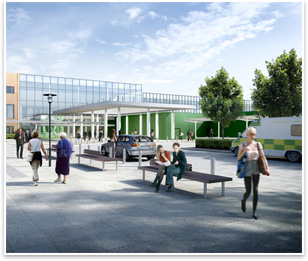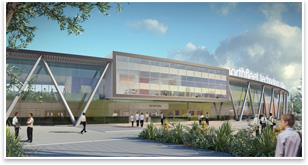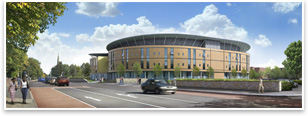HKS Finalizes Acquisition of London Office
by Tracy Ostroff
Contributing Editor
How do you . . . expand your global reach in a challenging economy?
Summary: HKS
Inc. finalized the acquisition of the remaining one-third ownership of London-based RyderHKS International from Ryder Ltd., a Newcastle architecture firm. The new office of about 100 people allows HKS to leverage specialty design experience in the UK and use it as a jumping off point for projects in Western and Eastern Europe and the Middle East, says Chair and CEO H. Ralph Hawkins, FAIA, FACHA. He also sees it as an entry into still growing international market sectors, including health care, sports complexes, and luxury hospitality.
The AIA’s resource knowledge base
can connect you to practice management and business articles.
See
what else SOLOSO has
to offer for your practice.
Recognizing the challenges AIA members are facing in these uncertain times, the AIA has established a collection of practical tips and resources available on AIA.org to help you in Navigating the Economy.
As a fully owned subsidiary, the firm will be completely integrated into HKS’s
international operations and renamed HKS Architects Limited. Hawkins explains it is part of a worldwide growth strategy that includes a newly announced office in Sao Paulo, Brazil, and perhaps a new China outpost in Shanghai or Beijing in a few years. It builds on growth in Chennai, India, and Abu Dhabi, United Arab Emirates.
With today’s market what it is, Hawkins says he sees a brighter future on the horizon—he thinks in about three to five years. The firm’s growing global presence follows the growth of the international market in health care, sports, and hospitality. The general population growth and aging in Europe and Asia means a need for more hospitals. More disposable income means more money for sporting events and luxury hotels.
The London office will provide a broad range of professional services
to clients throughout Europe, the Middle East, and Northern Africa,
including programming, master planning, space planning, interior
design, architectural design, construction documents, and construction
administration. Additional services available to clients are structural
design, medical planning, and environmental graphic design, HKS notes.
 Why London? Why London?
Hawkins explains that about five or six years ago, HKS formed an
alliance with Ryder Ltd., a Newcastle firm, to pursue a government
program that privatized development at health-care facilities in
the UK. The new entity was called RyderHKS Healthcare, and based
in London. At the time the partnership was 50-50 ownership. But
as growth put financial demands on Ryder, the smaller firm, HKS
first went to a two-thirds ownership arrangement, then to purchasing
the final third this summer, acquiring the business in its entirety
and renaming it as part of the global brand. The split was extremely
amicable, Hawkins says.
Feeling like they had the U.S. “pretty well covered,” and
another office in Mexico to handle Latin America, it was part of
their thinking of the original ownership agreement that they would
pursue the London office, Hawkins says. “London is the capital
of Europe,” Hawkins
says, and a place from which they can conduct business across the
continent and in northern Africa, where they are working on projects
in Egypt. Their office in Abu Dhabi was supposed to be for client
maintenance, but from there they are handling their African clients;
the office in Chennai was intended as an outsourcing business, but
from there they are working on cricket fields and buildings for Fidelity,
among other projects.
For Hawkins, it is “form follows funding,” he says. “Wherever projects are being funded is where we like to be.”
 National presence, international resources National presence, international resources
HKS’s high global profile in health-care, hospitality, sports, and commercial projects offers clients a diverse practice strong in many markets. Now the firm seeks to increase its geographic diversity through the London and Sao Paulo offices. But potential clients also want their architecture in the hands of a firm more local to the area.
Hawkins welcomes the growth potential and sees the global market as very well funded, albeit “tripped up in the last few months.” He says although the commercial sector “has turned out the lights” and hotels will slow for a while, HKS is still sending out proposals for health-care projects, which he calls the third or fourth tier of growth for communities.
 The AIA Architectural Billings Index, compiled by the AIA Economics and Research Team, recently found that “two thirds of the ABI panelists (62 percent) report that problems in financial markets have already directly affected projects at their firm. Firms with an institutional specialization were least likely to have already been affected, with just 45 percent reporting a direct impact.” The AIA Architectural Billings Index, compiled by the AIA Economics and Research Team, recently found that “two thirds of the ABI panelists (62 percent) report that problems in financial markets have already directly affected projects at their firm. Firms with an institutional specialization were least likely to have already been affected, with just 45 percent reporting a direct impact.”
As a fully owned subsidiary, the firm will be completely integrated
into HKS’s
international operations. Since its inception, the 104-person firm
has designed more than $890 million in construction in the UK,
including projects for the North Staffordshire Hospital, Kent Schools,
and Salford Hospital, in addition to designing the Liverpool FC Stadium.
|



